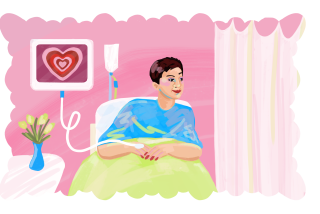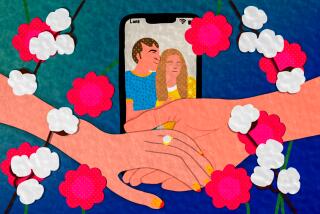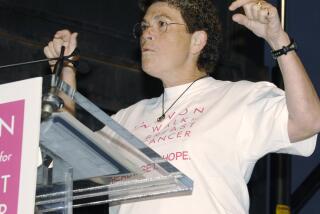Home, safe in bed
Our king-size bed used to be such a symbol of fun for me, and not just for the reason you might think.
My husband of 18 years and I would randomly hide silly objects -- tissue boxes, books, even alarm clocks -- on each other’s side of the bed, smoothing pillows and blankets to hide the bulge from the intended victim. There was no greater thrill than hearing a surprised yelp followed by, “Nice one!” But there hadn’t been any objects since the previous month, when I’d found multiple tumors in my left breast. We had other uses for tissues these days. Now that I was home from the hospital after my bilateral mastectomy, the idea of getting into or out of that bed filled me with fear.
I missed my adjustable hospital bed, the look of it when all bent up like an old man, the r-r-r-r-r sound of its creaking as it moved up and down, conforming to my body, rescuing me from the pain. The D-cups that Rob once confessed had first attracted him to me -- known as the “magnificent rack” -- had been replaced by flattened buds with Frankenstein-like stitches running horizontally across them.The rack now consisted of skin-stretching inflatable bags, hiding behind my pectoral muscles and bearing down on my chest like barrels of cement. Any movement in my pecs was excruciating. Getting in and out of bed was impossible without that whirring mechanism.
But here I was, back at home, tired and facing my plain old immobile bed, with only Rob to lower me onto it.
“If you drop me, even an inch, it’ll be torture.”
“I promise. I won’t drop you, not even an inch.”
I knew I was afraid of more than getting into bed. I was afraid that life might never get back to normal, that it wasn’t really true that Rob didn’t care about what happened to the rack, only me. That I might die soon; that we might never have fun again.
I sat down stiffly on my side of the bed, facing Rob. He leaned over me, supporting my neck and shoulders with his right arm. He gently curled his left one around my waist and lower back. I clutched a pillow to my chest and closed my eyes. He started lowering me. Suddenly, I was startled by a noise, a creaky whirring sound right behind me.
It was Rob, imitating the rhythmic tones of my adjustable bed -- r-r-r-r-r-r-r -- as he kept lowering me -- r-r-r-r-r-r. I laughed. He smiled.
That was over two years ago. The scars are fading and the rack’s doing fine. And just the other night, as I slid into bed, my head hit the pillow with a loud thud. I reached under the cushion and pulled out the 2,000-page Taber’s Cyclopedic Medical Dictionary with the shiny green cover.
Nice one.
--
Greenstein is a clinical psychologist and psycho-oncologist living in New York City with her husband and two sons. She’s writing a book, “The Clock on the Wall,” about living with cancer. [email protected]
--
My Turn is a forum for readers to recount an experience related to health or fitness. Submissions should be no more than 500 words. They are subject to editing and condensation and become the property of The Times. Please e-mail [email protected]. Although we read every essay, we can’t respond to every writer.


